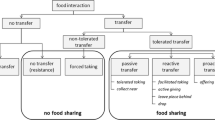Abstract
We describe food transfer patterns among Ache Indians living on a permanent reservation. The social atmosphere at the reservation is characterized by a larger group size, a more predictable diet, and more privacy than the Ache typically experience in the forest while on temporary foraging treks. Although sharing patterns vary by resource type and package size, much of the food available at the reservation is given to members of just a few other families. We find significant positive correlations between amounts transferred among pairs of families, a measure of the "contingency" component required of reciprocal altruism models. These preferred sharing partners are usually close kin. We explore implications of these results in light of predictions from current sharing models.
Similar content being viewed by others
References
Altman, J. 1987 Hunter-gatherers Today: An Aboriginal Economy of North Australia. Canberra: Australian Institute of Aboriginal Studies.
Andrews, P. in press Psychological Adaptation for Detecting Altruistic Displays: Accumulating Evidence from Wason Selection Task Studies. Cognition.
Axelrod, R., and W. D. Hamilton 1981 The Evolution of Cooperation. Science 211:1390–1396.
Bird, R. 1999 Cooperation and Conflict: The Behavioral Ecology of the Sexual Division of Labor. Evolutionary Anthropology 8:65–75.
Bliege Bird, R. L., and D. W. Bird 1997 Delayed Reciprocity and Tolerated Theft: The Behavioral Ecology of Food-sharing Strategies. Current Anthropology 38:49–77.
Blurton Jones, N. 1987 Tolerated Theft: Suggestions about the Ecology and Evolution of Sharing, Hoarding, and Scrounging. Social Science Information 26:31–54.
Boyd, R. 1988 The Evolution of Reciprocity in Sizable Groups. Journal of Theoretical Biology 132:337–356.
Clastres, P. 1972 The Guayaki. In Hunters and Gatherers Today, M. Bicchieri, ed. Pp. 138–174. New York: Holt, Rinehart, and Winston.
Cosmides, L., and J. Tooby 1992 Cognitive Adaptations for Social Exchange. In The Adapted Mind, J. Barkow, L. Cosmides, and J. Tooby, eds. Pp. 163–228. New York: Oxford University Press.
Fretwell, S. D., and J. H. J. Lucas 1970 On Territorial Behaviour and Other Factors Influencing Habitat Distribution in Birds. Acta Biotheoretica 19:16–36.
Gurven, M., K. Hill, H. Kaplan, A. M. Hurtado, and R. Lyles 2000a Food Transfers among Hiwi Foragers of Venezuela: Tests of Reciprocity. Human Ecology 28:171–218.
Gurven, M., W. Allen-Arave, K. Hill, and A. M. Hurtado 2000b "It’s a Wonderful Life": Signaling Generosity among the Ache of Paraguay. Evolution and Human Behavior 21:263–282.
Gurven, M., K. Hill, and H. Kaplan in press From Forest to Reservation: Transitions in Food Sharing Behavior among the Ache of Paraguay. Journal of Anthropological Research 58(1), 2002.
Hames, R. 2000 Reciprocal Altruism in Yanomamo Food Exchange. In Human Behavior and Adaptation: An Anthropological Perspective, L. Cronk, N. Chagnon, and W. Irons, eds. Pp. 397–416. New York: Aldine de Gruyter.
Hamilton, W. D. 1964 The Genetical Evolution of Social Behavior. Journal of Theoretical Biology 7:1–52.
Hawkes, K. 1993 Why Hunter-gatherers Work: An Ancient Version of the Problem of Public Goods. Current Anthropology 34:341–361.
Hawkes, K., H. Kaplan, K. Hill, and A. M. Hurtado 1987 Ache at the Settlement: Contrasts between Farming and Foraging. Human Ecology 15:133–161.
Hill, K., and K. Hawkes 1983 Neotropical Hunting among the Ache of Eastern Paraguay. In Adaptive Responses of Native Amazonians, R. Hames and W. Vickers, eds. Pp. 139–188. New York: Academic Press.
Hill, K., and A. M. Hurtado 1996 Ache Life History: The Demography and Ecology of a Foraging People. New York: Aldine de Gruyter.
Hill, K., and H. Kaplan 1989 Population Description and Dry Season Subsistence Patterns among the Newly Contacted Yora (Yaminahua) of Manu National Park, Peru. National Geographic Research 3:317–324.
1993 On Why Male Foragers Hunt and Share Food. Current Anthropology 34: 701–710.
Hill, K., and T. Tikuarangi 1998 The Mbaracayu Reserve and the Ache of Paraguay. In Traditional Peoples and Biodiversity Conservation in Large Tropical Landscapes, K. H. Redford and J. A. Mansour, eds. Pp. 159–195. Arlington: America Verde.
Hoffman, E., K. McCabe, and V. Smith 1998 Behavioral Foundations of Reciprocity: Experimental Economics and Evolutionary Psychology. Economic Inquiry 36:335–352.
Holmberg, A. R. 1969 Nomads of the Long Bow: The Sirionó of Eastern Bolivia. New York: Natural History Press.
Hurtado, A. M., and K. Hill 1987 Early Dry Season Subsistence Ecology of Cuiva (Hiwi) Foragers of Venezuela. Human Ecology 15:163–187.
Hurtado, A. M., K. Hawkes, K. Hill, and H. Kaplan 1985 Female Subsistence Strategies among Ache Hunter-gatherers of Eastern Paraguay. Human Ecology 13:1–28.
Kaplan, H., and M. Gurven n.d. the Natural History of Human Food Sharing and Cooperation: a Review and a New Multi-individual Approach to the Negotiation of Norms. Ms. in preparation, Department of Anthropology, University of New Mexico.
Kaplan, H., and K. Hill 1985 Food Sharing among Ache Foragers: Tests of Explanatory Hypotheses. Current Anthropology 26:223–245.
Kaplan, H., K. Hill, K. Hawkes, and A. M. Hurtado 1984 Food Sharing among the Ache Hunter-gatherers of Eastern Paraguay. Current Anthropology 25:113–115.
Kaplan, H., K. Hill, and A. M. Hurtado 1990 Risk, Foraging, and Food Sharing among the Ache. In Risk and Uncertainty in Tribal and Peasant Economies, E. Cashdan, ed. Pp. 107–144. Boulder: Westview Press.
Kaplan, H., K. Hill, J. Lancaster, and A. M. Hurtado 2000 A Theory of Human Life History Evolution: Diet, Intelligence, and Longevity. Evolutionary Anthropology 9:156–185.
Rothstein, S. I., and R. Pierroti 1988 Distinctions among Reciprocal Altruism, Kin Selection, and Cooperation and a Model for the Initial Evolution of Beneficent Behavior. Ethology and Sociobiology 9:189–209.
Sahlins, M. 1972 Stone Age Economics. Chicago: Aldine.
Smith, E. A., and R. Bliege Bird 2000 Costly Signaling and Turtle Hunting. Evolution and Human Behavior 21:245–261.
Stephens, D. W. 1990 Risk and Incomplete Information in Behavioral Ecology. In Risk and Uncertainty in Tribal and Peasant Economies, E. Cashdan, ed. Pp. 19–46. Boulder: Westview Press.
Trivers, R. L. 1971 The Evolution of Reciprocal Altruism. Quarterly Review of Biology 46:35–57.
Winterhalder, B. 1986 Diet Choice, Risk, and Food Sharing in a Stochastic Environment. Journal of Anthropological Archaeology 5:369–392.
1996 A Marginal Model of Tolerated Theft. Ethology and Sociobiology 17:37–53.
1997 Social Foraging and the Behavioral Ecology of Intragroup Resource Transfers. Evolutionary Anthropology 5:46–57.
Author information
Authors and Affiliations
Corresponding author
Additional information
This research was supported by an L.S.B. Leakey Foundation grant and an NSF Graduate Fellowship to M. Gurven, and NSF Grant #9617692 to K. Hill and A. M. Hurtado.
Michael Gurven recently obtained his Ph.D. from the University of New Mexico and is now an assistant professor at UC-Santa Barbara. His current interests include exploring ways in which socioecology influences variation in cooperation within and across human groups, and how cultural norms of fairness co-evolve with systems of resource production and distribution.
Wesley Allen-Arave is pursuing his Ph.D. in anthropology at the University of New Mexico. His primary research interests focus on exploring variations across time and space in nonreciprocated altruistic acts, cooperation within social networks, and concerns over social approval.
Kim Hill is a professor of anthropology in the Human Evolutionary Ecology (HEE) program at the University of New Mexico. His primary research interests include hunter-gatherer behavioral ecology, life history theory, food acquisition strategies, food sharing, cooperation, and biodiversity conservation in lowland South America. He has done fieldwork with Nahautl, Ache, Guarani, Hiwi, Mashco Piro, Matsiguenga, and Yora indigenous peoples of Central and South America.
A. Magdalena Hurtado is associate professor of anthropology at the University of New Mexico. Her research interests include the evolution of cooperation between the sexes, infectious disease and immune system adaptations, the epidemiology of hunter-gatherer societies in transition, and the effects of health on economic productivity. During the past 20 years she has conducted fieldwork among several South American native populations but now works primarily among the Ache of eastern Paraguay.
Rights and permissions
About this article
Cite this article
Gurven, M., Allen-Arave, W., Hill, K. et al. Reservation food sharing among the Ache of Paraguay. Hum Nat 12, 273–297 (2001). https://doi.org/10.1007/s12110-001-1000-3
Received:
Accepted:
Issue Date:
DOI: https://doi.org/10.1007/s12110-001-1000-3




